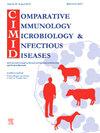中国蛇类中贾第鞭毛虫属的出现和分子特征。
IF 2
3区 农林科学
Q4 IMMUNOLOGY
Comparative Immunology Microbiology and Infectious Diseases
Pub Date : 2024-10-05
DOI:10.1016/j.cimid.2024.102247
引用次数: 0
摘要
肠贾第虫是一种主要的腹泻寄生虫,寄生在人类和其他各种哺乳动物(包括宠物和家畜)的小肠近端。尽管贾第虫遍布全球,但有关贾第虫在爬行动物(尤其是蛇)中流行病学的信息却很有限。本研究的目的是通过聚合酶链式反应(PCR)扩增贾第虫的 beta-giardin(bg)基因,然后进行比较进化树分析,以确定贾第虫在蛇类中的发生情况和分子特征。我们从中国 26 个省份采集了 603 个无症状样本,代表的物种包括:古豹(Pantherophis guttatus)、钝头豹(Pantherophis obsoletus)、黑鳞蝮(Pituophis melanoleucus)、石斑蝮(Thamnophis sirtalis)、斑蝮(Lampropeltis getula)和鼻鳞蝮(Heterodon nasicus)。最终,在这些蛇类中检测到的贾第虫感染率为 4.15%,其中玉米蛇(Pantherophis guttatus)的感染率明显高于其他物种。分子分析确定 F 组合是主要基因型,同时还确定了可感染人类和各种哺乳动物的 B 组合。这项研究结果表明,贾第虫有可能从蛇类传染给人类,尤其是在密切接触的环境中。本流行病学研究探讨了爬行动物中贾第虫的流行病学调查,提供了了解贾第虫人畜共患风险的数据,并强调有必要进行有针对性的监测、采取严格的卫生措施和开展提高公众意识的活动,以降低这些风险。本文章由计算机程序翻译,如有差异,请以英文原文为准。
Occurrence and molecular characterization of Giardia spp. in snakes from China
Giardia intestinalis is a major diarrhea-causing parasite that colonizes the proximal small intestine of humans and various other mammalian species, including pets and livestock. Despite its global occurrence, there is limited information about the epidemiology of Giardia in reptiles, particularly snakes. The aim of this study was to amplify the beta-giardin (bg) gene of Giardia by polymerase chain reaction (PCR), followed by a comparative evolutionary tree analysis to determine the occurrence and molecular characterization of Giardia in snakes. We collected 603 asymptomatic samples from 26 provinces in China, representing species such as Pantherophis guttatus, Pantherophis obsoletus, Pituophis melanoleucus, Thamnophis sirtalis, Lampropeltis getula, and Heterodon nasicus. Ultimately, a occurrence of Giardia infection of 4.15 % was detected in these snakes, with corn snakes (Pantherophis guttatus) having a significantly higher occurrence than other species. Molecular analysis identified assemblage F as the predominant genotype, and also identified an assemblage B that can infect humans and a variety of mammals. The results of this study illustrate the potential risk of transmission of Giardia from snakes to humans, especially in environments where close contact occurs. The present epidemiological study examines epidemiological investigations of Giardia in reptiles, provides data to understand the zoonotic risk of Giardia, and emphasizes the need for targeted surveillance, stringent hygiene measures, and public awareness campaigns to reduce these risks.
求助全文
通过发布文献求助,成功后即可免费获取论文全文。
去求助
来源期刊
CiteScore
4.60
自引率
0.00%
发文量
102
审稿时长
40 days
期刊介绍:
Comparative Immunology, Microbiology & Infectious Diseases aims to respond to the concept of "One Medicine" and to provide a venue for scientific exchange. Based on the concept of "Comparative Medicine" interdisciplinary cooperation between specialists in human and animal medicine is of mutual interest and benefit. Therefore, there is need to combine the respective interest of physicians, veterinarians and other health professionals for comparative studies relevant to either human or animal medicine .
The journal is open to subjects of common interest related to the immunology, immunopathology, microbiology, parasitology and epidemiology of human and animal infectious diseases, especially zoonotic infections, and animal models of human infectious diseases. The role of environmental factors in disease emergence is emphasized. CIMID is mainly focusing on applied veterinary and human medicine rather than on fundamental experimental research.

 求助内容:
求助内容: 应助结果提醒方式:
应助结果提醒方式:


